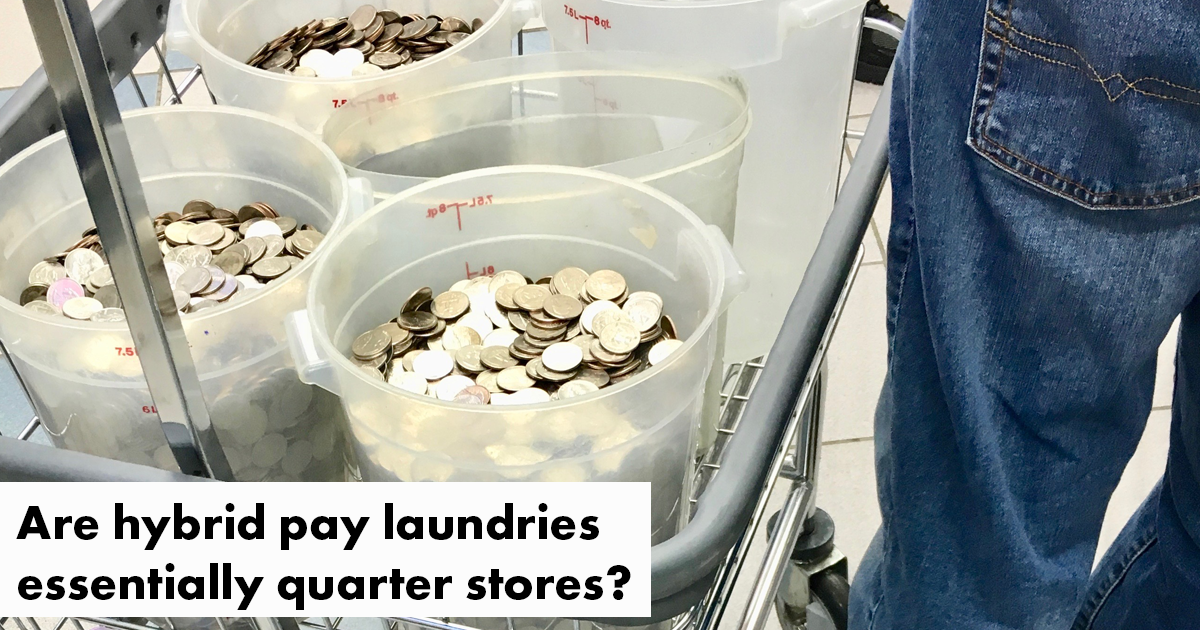Are hybrid pay laundries essentially quarter stores?

The pandemic is helping us understand what’s truly essential in laundromat operations. Remaining open to the public is one thing. Giving them what they want and need is something else.
Navigating the surreal coronavirus landscape demands a novel approach to the business of washing and drying. We see it evolving before our eyes: Load and go replacing watch and wait. Counter service moving curbside. And pickup & delivery vans driving everything home.
While much has changed, one thing has not — the industry’s reputation. Last spring, news crews across the country turned the spotlight on dedicated store staff and their non-stop sanitizing of washers, further cementing the laundromat as the place to get your clean on.
Suddenly, out of left field, the pandemic threw a curve ball. Cameras swung around to focus instead on the change machines. There was a buzz about a coin shortage stinging owners who were happy to serve as the neighborhood laundry, not its bank.
Day by day the changer hopper levels kept dropping. And those of us who deal with laundromat pay saw incoming calls rising. Store operators weren’t just annoyed by quarters walking out the door, they were agitated — and worried.
Non-patrons have always made a beeline to changers. The perpetrators see no harm feeding in a twenty to gather up 80 quarters before heading home to wash loads in their apartment laundry room. To them, it’s a dollar-for-dollar exchange.
The pandemic’s perfect storm of closed bank lobbies and hoarding mentality turned what used to be an occasional visit into a parade. Quarter-strapped individuals and businesses started hitting laundromats to stock up.
Frustrated owners, who used to casually dismiss the public’s easy access to change, were coming under assault. They came to the realization that their well-oiled moneymaker runs on one coin — the quarter.
When hundreds — if not thousands — of dollars in change goes AWOL weekly without sufficient replenishment, the vulnerability of a coin dependent business is sure to give its owners sleepless nights. After all, how can you expect to operate when the very money used to make money never makes it to the cashbox?
Hybrid owners make noise
Coin’s flight out the door was in the news and quickly picked up in social media circles like my popular Laundromat Owners Showcase Facebook group.
Interestingly, the television segments and print articles revealed a fair share of hybrid pay operators complaining just as loudly as those running quarter-only stores.
On display for the cameras — and for all the world to see — were card readers, kiosks, phone app logos and QR codes vying for attention right there with the ubiquitous quarter coin drop.
Those nifty alternative pay formats received passing mentions, along with expressions of hope that the public would avail themselves of the cashless options on offer. But the message coming from both laundry customers and owners could be summed up in three words: Quarters, quarters, quarters.
Fears of dirty money spreading the infectious disease turned out to be nothing more than unsubstantiated reports and another attempt to trash cash. In fact, as coins became scarce, people couldn’t wait to get their hands on more of them.
Focus is on the mech, not tech
When I don my sales hat and field calls from laundromat operators across the country, the majority tell me they run exclusively on quarters — a single coin dispensed at changers and accepted in every machine. I listen to their all-too-familiar tale of quarter bandits raiding inventories before we get to work on solutions to chase them away.
Then there are the inquiries where I hang on the caller’s every word — hybrid owners whose pay platform boasts a means to activate washers and dryers without quarters.
Their machine readers, wall kiosks and phone apps are functioning fine, thank you. So why are they ringing me — that guy with a coin and token acceptance drop? The calls speak volumes: The coin shortage is hurting them as well.
Employing great technology didn’t break their dependence on coin. They still find themselves essentially running a quarter store. Whatever the figure — 70, 80 or 90 percent — the biggest chunk of their revenue stream relies on that single round coin measuring less than an inch.
One west coast operator told me he remains optimistic more customers will tap his laundry’s phone pay system. Today, fewer than one-in-ten use it. Faced with an outflow of quarters and bank tellers turning their backs on pleas for bagged or rolled coins, his focus was on the coin drop mechanism itself, not what was tethered to it.
Like so many others, laundromat’s dynamic duo of dollar coins and quarters prompted his inquiry. When the topic of circulating tokens and becoming his own bank entered the conversation, he was all ears.
What perked him up? Operating a private money system that eliminates the reliance on quarters while welcoming customers to spend with coin, paper currency or even credit and debit cards.
It’s been 37 years since I converted my family’s coin-op to a token-op, yet the same holds true today: The system works and it doesn’t rely on quarters.
Pay options make sense for laundromat owners. But it must be a humbling experience to take one of the highly-touted hybrid routes and watch as your patrons bypass new tech for the ol’ mech.
I guess you could say one part of that hybrid isn’t proving to be so essential after all.

Laurance Cohen is part of the Imonex team and welcomes inquiries on innovative payment solutions for your business.
laurance@imonex.com
(954) 999-7785

